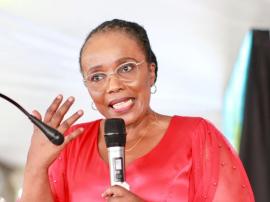
Women, Youth and Persons with Disabilities Minister, Sindisiwe Chikunga, has commended traditional leaders for their continued support in the fight against gender-based violence and femicide (GBVF).
“We are deeply touched by the unwavering commitment of our traditional leaders who continue to come together to insist that the elimination of GBVF will happen, not in the future - today!” Chikunga said.
She was speaking at the close of the 16 Days of Activism for No Violence Against Women and Children campaign at Ntsimbini Sports Ground in Port St John’s, in the Eastern Cape, on Tuesday.
While 10 December marks the end of the campaign, the day also kickstarts government’s intention to confront the scourge of GBVF in South Africa for 365 days.
Highlighting some of the department’s planned interventions to strengthen the campaign against GBVF, Chikunga said the department will continue to call on and join hands with traditional leaders in the fight against GBVF.
She said the National House of Traditional and Khoisan Leaders are uniquely positioned to lead a community-driven and sustainable response to GBVF.
The Minister expressed her appreciation to King Misuzulu kaZwelithini and all traditional leaders who joined the Goodmen Foundation march against GBVF in Durban, last week.
“The march was not merely symbolic. It is a movement of conviction, a practical expression of Ubuntu - the belief that our humanity is inextricably linked, and none of us is free until all of us are free,” Chikunga said.
Following an engagement with the South African Council of Churches, Chikunga said the department will be ramping up the 16 Days of Activism campaign working with organised religion.
She said the findings of the recently released South African National Gender-Based Violence Prevalence Study: A Baseline Survey on Victimisation and Perpetration, will serve as a guide for immediate action.
“The recommendations of this study will contribute to our ongoing focus on prevention, enhanced protection for victims, and ensuring that perpetrators are held accountable. We are currently incorporating it into our five-year strategic plan for the seventh administration.
“We will also continue to mobilise funding from both public and private sector sources to ensure that our interventions against GBVF are adequately resourced. Support for civil society will be crucial in this regard,” Chikunga said.
This year’s 16 Days of Activism campaign was observed under the theme "Celebrating 30 Years of Democracy Towards Women’s Development”.
During the campaign period, which started on 25 November, South Africa reflected on the strides made, including the challenges overcome, and the victories achieved by the country.
Reflecting on what has been done over the past 30 years, Chikunga said for South African women, the past 30 years have been a continuation of a long and mighty walk, and a journey both tragic and heroic.
“Not long ago, women were considered unfit for careers in fields like science, engineering, medicine, and law. The idea of women serving on the bench also seemed far-fetched due to entrenched patriarchal beliefs, however, over the past 30 years, South Africa’s journey to transform the gender and racial composition of the judiciary has been nothing short of exemplary.
“In the past three decades, South African women have gone from the shaping of our constitutional democracy to the historic ascendance of Justice Mandisa Maya as the first South African woman to occupy the position of Chief Justice and Head of the Constitutional Court,” Chikunga said.
The country has also surpassed gender parity in higher education participation rates, with the production of world-renowned women as agriculture industrialists, entrepreneurs, aviators, mariners, engineers, and artists.
The country has further made significant strides in ensuring equal representation in decision-making and law-making structures. Today, women hold 43.5% of the seats in Parliament, occupying 171 out of 400 seats, an increase from 28% representation in 1994.
In the current administration, 42.66% of Executive Members are women. - SAnews.gov.za


